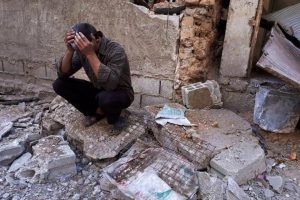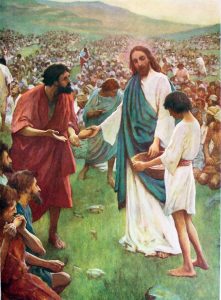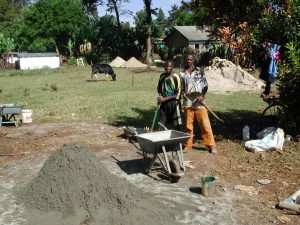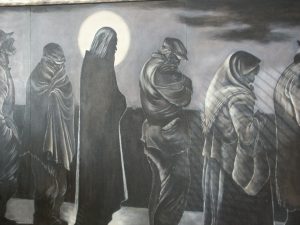Hungering for Justice; Thirsting for Love
(2 Kg 4:42-44; Ps 145; Eph 4:1-6; Jn 6:1-15)
**************************************************
One night on television, a news item featured the reality of children starving in Zimbabwe. Pictures of children with extended stomachs troubled the viewers; a few minutes later, another news item dwelt on the problem of obesity among youth in North America. Not surprisingly, the program stated the medical concern that obese children were more prone to heart attacks.
The readings today address both issues with the clear message: we must share our wealth to combat poverty, and learn to love our children again to combat rampant social problems among our youth.

There are two kinds of hunger, two kinds of thirst in today’s world: physical and spiritual
Regarding physical hunger and thirst, Jean-Pierre Prevost, in his commentary on today’s readings in the Living With Christ,provides shocking statistics. In our day and age, he states, some 800 million people still suffer from malnutrition, and 18,000 children die from hunger every day– in a world that claims unparalleled living standards and unmatched technological sophistication.
The prophets of the Old Testament, like Amos, Isaiah and Jeremiah, were quick to denounce the unequal distribution of wealth and food, and so must we. How can we tolerate social and political systems that favour the corporate rich while making life more difficult for the poor? We must, like the Old Testament prophets, work for justice and strive to bring about greater equality in our world.

The multiplication of the loaves by Jesus in the gospel was a direct response to the physical hunger of the people before him. Of course, there was a much deeper spiritual level to this miracle, but he first fulfilled the physical hunger of the people. So must we if we are to call ourselves his followers.
The Oblates of Mary Immaculate started up a mission to Kenya in 1998. Very quickly they realized one of the major needs for the multitudes of poor people living in a mountainous area was the need for clean water to drink and to irrigate their crops. So, they started a water project with the help of Engineers without Bordersto bring water down the mountain to the valley below. Working with the people and with international financial assistance, that project is now successfully run by the people themselves and providing water for thousands. The gospel of today is being lived out in Kenya. The Old Testament prophets would certainly approve.

Workers at the Oblate Pre-novitiate in Meru, Kenya
But the social problems plaguing so many of our youth today speak loudly of another kind of hunger and thirst, the hunger and thirst for love. Mother Theresa of Calcutta, when she visited North America, quickly and astutely observed that while children in India were dying of starvation, children in North America were dying of a lack of love, a lack of affection, a lack of affirmation.
She sensed that for all too many in our wealthy nation, children were no longer a value, evidenced by the high rate of abortion. Children were being emotionally abandoned and given counterfeit love, so she cried out if the children were not wanted in North America, give them to her and she would find loving homes for them.
This modern plague affects not only the youth. Just recently on the CBC news, a report stated that 90% of the residents of a particular community in the Northwest Territories were regularly abusing pot as a drug of choice. It had become a way of life.
In one diocese, the pastor has had to deal with an average of one suicide a month in one of the communities where he ministers. Another is very concerned about the deadly reality of gang violence in his community that led to the death of a youth just before Easter of this year.
What is this all about? What is going on? In other parts of the world, people are struggling to live yet dying of hunger. In the developed world, people are eating too much yet wanting to end their lives by their own hand. Does this make any sense? I don’t think that the Old Testament prophets had this problem, but I am sure they would have raised their voices in protest and addressed this issue, and so must we.
I believe that there are three deep human needs that are not being met in the lives of many youth and adults in our society today. Those three needs are the need to be loved, the need to belong, and the need to be esteemed.
In one community, a burly fisherman was coming off a drunk. His wife called me to come and talk to him. When I arrived, he was sitting on a couch, surrounded by his three children and wife who all loved him, yet he was crying “Nobody loves me.” His parents both died of alcoholism and he was convinced that he was unloved and unlovable. He was hungering and thirsting for love.

A young girl in Don Bosco Homes in Regina was being beaten up by a motorcycle gang. When asked why she hung out with those people, she replied she had to belong somewhere. She was hungering for real love, for acceptance. That same girl was caught flushing her medication down the drain of a toilet. When told she needed that medication to live, she replied she didn’t care. She was thirsting for real love, for some sense of value and esteem.
The high rate of addictions in our society, the high rate of obsessive/compulsive diseases and suicides, all scream out of a desperate need for love. We must learn to love our children, to love each other, and to love ourselves once again.
The multiplication of the loaves by Jesus and the fragments left over, coupled with his refusal to be branded a political ruler and wealthy king, is a strong statement that He is the only one who can truly satisfy the longings and yearnings of the human heart, as well as the material needs of the people. If we are to call ourselves his followers, we must work for justice like him, and learn to love our children again as he has loved us.
The Eucharist takes on even deeper meaning for us in the context of our modern society facing both the reality of poverty and starvation abroad and at home, as well as the deeper reality of emotional and spiritual thirst for love.

As we are cleansed by God’s Word and nourished by the Body and Blood of Jesus, we are empowered, indeed mandated, to go out and to make a difference in our world, using our gifts, talents and wealth, to work for justice and to learn to love our children once again.




This is a heart loving and caring homily and message about feeding the hunger, provide shelter the homeless, cloth the naked and thirsty for water. Some are thirsty for the love; when they are poor. There are many children and youths who are abused and neglected from their family members. They feel that no body cares about them and love them anymore. They have that pain and sufferings bottled up inside them because they have no way in dealing with their emotions. There is nobody to talk to and express these feelings that is why these children end up committing suicide and wanting to end their life. These youths have no love, belonging and esteem to remain in this society and community. So, they think this is the only way to resolve any problems without asking for help. God teaches us to love ourselves, love our neighbors and loving our enemies. We should do the same for those poor children and adults in those countries. We are to help the poor, the needy and heal the sick and people with other problems. All of this comes from our hearts. Amen . Many Blessings!
All the thanks Bishop Sylvain Lavoie for the homilies and teachings in today’s readings and lessons we needed to hear in our lives. We should keep this in our minds. I love You Jesus Christ. Lovely pictures and I am heart warming reading your homilies… Blessings! Blessings!
I was hungry, thirsty, a stranger, naked, sick, in prison you have the will to care for me. I was a stranger , you welcome me. I was hungry you gave food. I was thirsty, you gave me drink. I was sick you visited me. I was naked you clothed me and when I was in prison you came to me. I admire this statement and this relates to today’s readings .
That statement is fro this book, “You Did It to Me “. From Fr. Michael E. Gaitley MIC